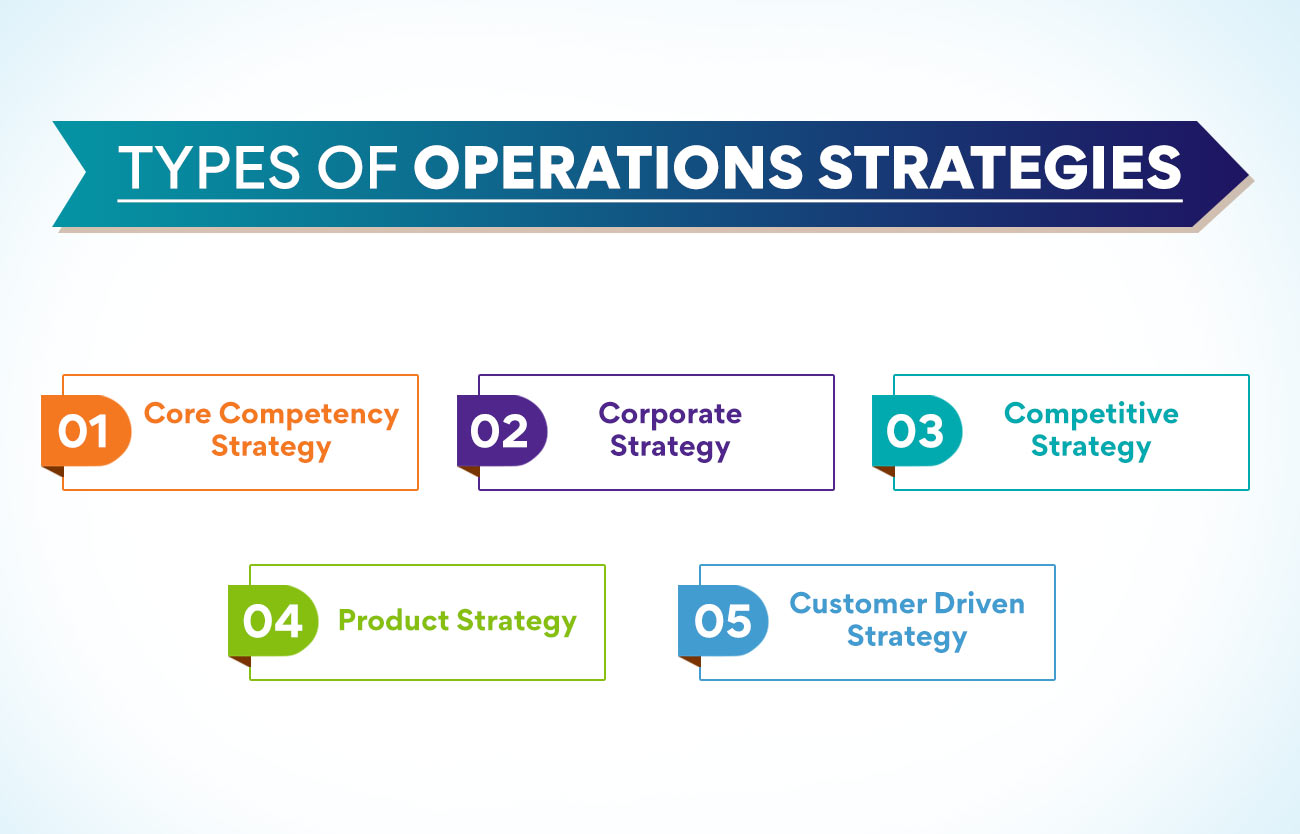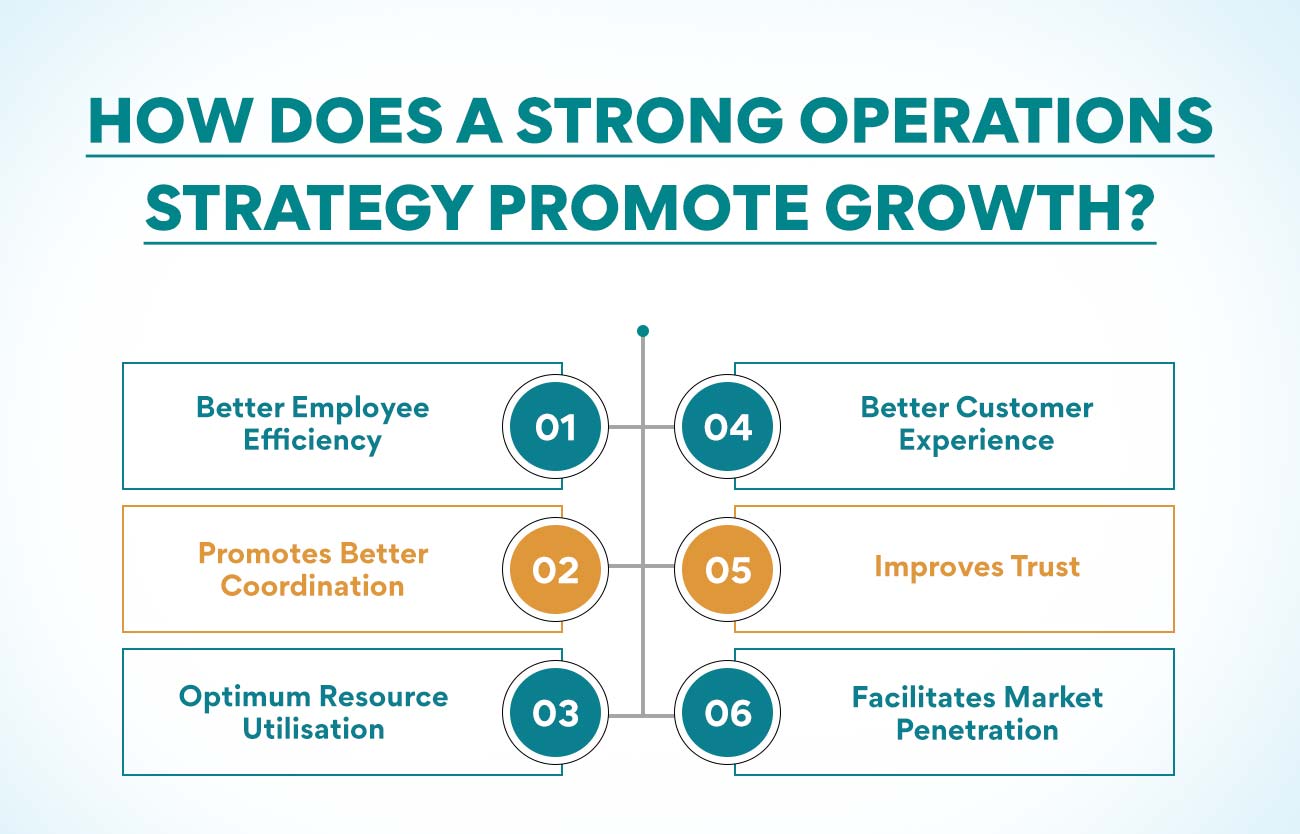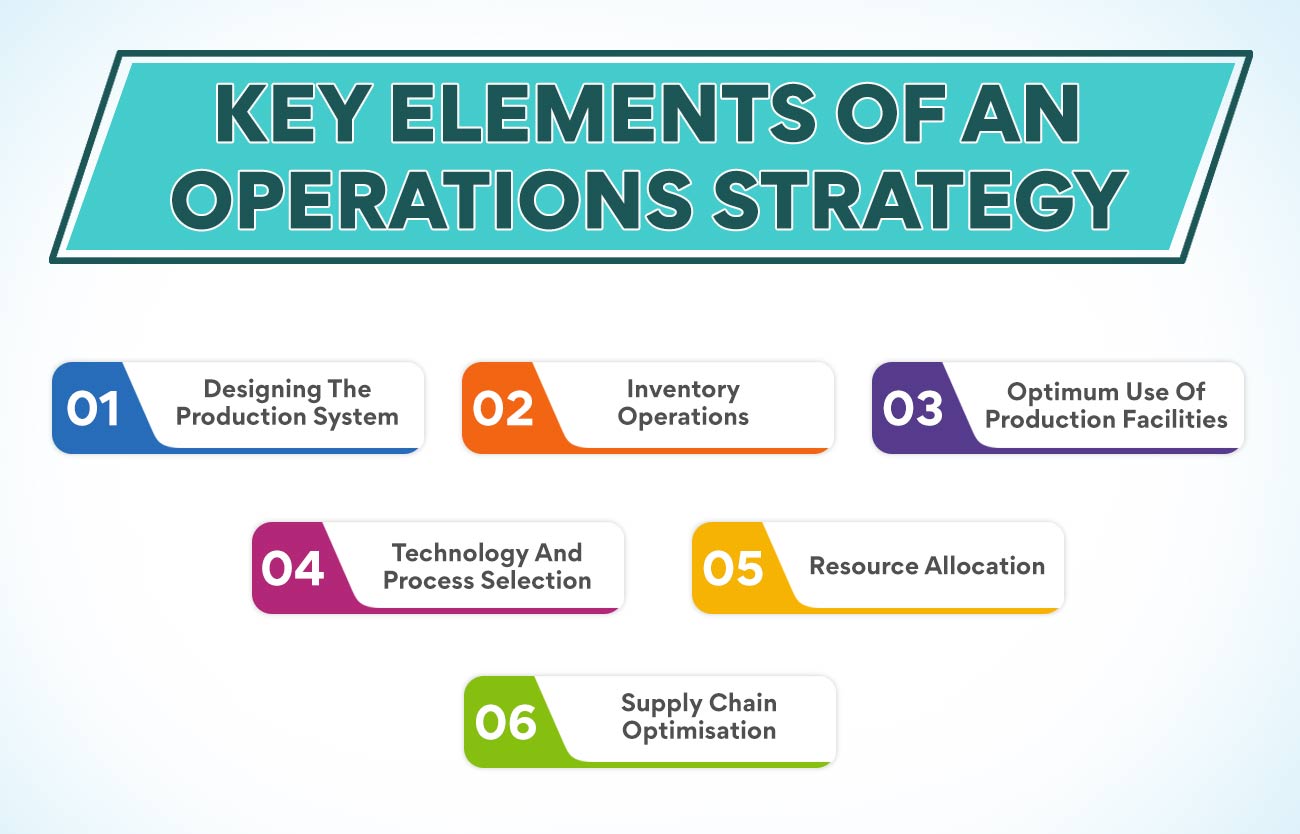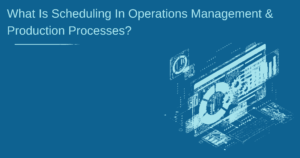All businesses depend on a system that optimally uses the available resources, people, and processes. Companies must ensure that all processes are efficient and work towards achieving the firm’s objectives. Though the specific goals of different companies may vary, there are a few common things. All organisations want to reduce costs and improve profitability. They want to capture the major share of the market they operate in. A proper operations strategy is necessary to ensure that all processes are efficient and aligned to common goals.
What Is An Operations Strategy?
Before we look at operations strategy, it is essential to know what we mean by the term operations. Operations are those steps or processes that help the company make a product or service and sell it to its customers. It is the prime duty of the operations manager to ensure that these processes function efficiently and work towards achieving the firm’s goals. Various decisions need to be taken regarding different operations. All these combine to form the operations strategy of the establishment. It must make the company profitable and remain competitive in the market.
What you will see in this article about operations strategy is just the tip of the iceberg. If you desire to become an expert in the subject, join our advanced certificate in Operations, Supply Chain, and Project Management. A visit to our website will show you more about the course.
The Need For Operations Strategy
Why do companies need an operations strategy? While it is only a part of the business strategy, companies need to remain competitive in the market. It will not just include the firm’s existing processes and technologies. A good strategy will also consider the supply chain, customer needs, the organisation’s strengths, and weaknesses, competitors, and the facilities available. Analysing these factors will help understand how each supports or hinders the business strategy. Companies can learn what needs to be done to optimise their operations.
With a good strategy, operations management can make sure that the manufacturing processes are aligned with sales requirements. It helps to ensure that costs are maintained at optimal levels throughout the process. A good plan of operations will also help in preventing it from functioning unexpectedly. Updating the strategy regularly will ensure that the company does not lose its competitive edge. The firm can update the products with new features or create new ones to remain strong in the market. Collecting regular information from competitors helps to identify the organisation’s strengths and weaknesses.
Key Elements Of An Operations Strategy
- Designing The Production System
This element includes planning the product design and method. There are mainly two types of product designs.
Custom Product Design – In this type, the products are made as per the specific requirements of individual customers. Some examples of such product designs are boilers, air compressors, and turbines. These products have special features that are already present or inbuilt. The sales of these products are low and target only a particular customer segment.
Standard Product Design – As the name suggests these products have a standard design that is made as per the requirement of a large section of the market. There are no special features to suit individual customers. Such a design is good for producing large quantities to meet steady demand. Fans, televisions, and air conditioners are examples of standard product design. These products achieve a very high sales volume.
When planning the production system, the company must decide what segment of customers it will target. It must also consider the facilities available for meeting the client’s requirements.
- Inventory Operations
Inventory is an important element in the operation of every company. Stocking the optimal amount of raw materials and finished goods is critical for ensuring customer satisfaction and profitability. When formulating the operation strategy for inventory, one must ensure a clear system for ordering, maintaining, and processing materials. One must put in place systems that help to reduce cost and waste. A good strategy will help the organisation maintain the optimal stock level and make the best use of available storage spaces.
- Optimum Use Of Production Facilities
This is another element of operations strategy that helps the firm meet customer demands while improving its profits. While formulating the strategy, it is essential to focus on the available production facilities and how best companies can use them to provide special benefits to the customer. Certain production lines may be specialised to produce items at a lower cost to cater to a particular customer segment. Organisations can also achieve faster delivery or higher quality of the product in this way.
It is not enough to plan the existing facilities. Companies must keep in mind the future requirements when formulating the operations strategy. Forecasting future sales is necessary to assess the need for increasing production facilities. There must be regular updates of the strategy to include changing market demands.
- Technology And Process Selection
Selection of technology is an important part of planning operations. After designing the product, it is time to decide on its manufacturing technology. This will depend on the benefits the firm plans to offer its customers. Officials entrusted with operations management must look at what technology can be used to manufacture products that offer specific benefits to clients. If the company focuses on offering a price benefit, it must choose machinery that will cost less to purchase and maintain.
You must not restrict technology selection to production. Experts must do this for every operation, including storage, delivery, etc. A company keen on giving customers faster delivery must invest in technology that will help in faster movement of goods. There are many alternatives available for production and packaging technology. When formulating the operations strategy, it is essential to focus on what the company aims to deliver to the customer and decide on types of machinery that will help achieve that end.
- Resource Allocation
Something common to most organisations is the shortage of resources. This is especially true for production. So a proper allocation of resources must be done. It will include cash, people, machines, materials, services, etc. There must be a clear plan about how and when the available resources will be allocated. Different production teams must have access to these resources to attain optimum production capacity. The timing of allocation is also very important to help reduce costs and improve efficiency. A good operations strategy facilitates the best use of available resources and minimises waste.
- Supply Chain Optimisation
The supply chain is a critical part of business operations. The movement of goods from the raw material supplier to the customer depends on how good your supply chain is. It includes various elements like purchase, transport, storage, and documentation. Proper planning must be done for each of these so that the cost comes down and customer experience improves. An effective operations strategy will describe the structure of the supply chain. It will also discuss in detail where the products must be made and stored to make delivery to the customer fast and economical.
You can learn more about these elements in our advanced certificate course in Operations, Supply Chain, and Project Management. Visit the website to know how operations professionals and those who aspire to join the department will benefit from this program.
Types Of Operations Strategies

Core Competency Strategy
In this type of operations strategy, a company focuses on its existing strengths. The aim is to leverage the strengths of the organisation to maximise profitability. The market segment and the product types will be decided based on the available facilities and technology.
Corporate Strategy
The overall business strategy of the company is used to create this type of operations strategy. It will adhere to the establishment’s mission and objectives. Such firms will develop the production initiatives, key performance indicators, and decision-making processes based on the goals determined by the leaders and stakeholders.
Competitive Strategy
In this case, companies use information about their competitors to plan the course of action. These firms will see how to gain an edge over the competition. They will either offer a product that is more economical or one that can be delivered faster than the competitor.
Product Strategy
The operations strategy is formed based on the products or services they can offer. The company will often change tactics when new products are developed. They depend on the product managers to make their plans.
Customer Driven Strategy
As the name suggests, in this type, the focus is on customer demand. Their aim is to fulfill customer expectations and give them a better experience. Their operations strategy will be made based on the information received from the sales and marketing teams.
How Does A Strong Operations Strategy Promote Growth?
A strong operations strategy helps all departments in the company to implement the overall business strategy. Let us look at how it brings about growth for the organisation.

- Better Employee Efficiency
The goals of different business units and departments are well defined by an operations strategy. The employees in various departments know what they are expected to do. They will also know how they are contributing towards achieving the company objectives. It helps them use their time more effectively. Managers can also find out which teams are performing well and which ones need to improve.
- Promotes Better Coordination
Departments in a company must work together to achieve overall business goals. An operations strategy clearly defines how different departments must work together. It enhances coordination between business units. Every department also understands how they can work together with others and contribute to the company’s growth. It also makes staff members feel that they are all part of the same team.
- Optimum Resource Utilisation
Companies must use their resources intelligently to achieve maximum profits. The operations strategy outlines how resources must be shared between different departments. It results in less wastage and more efficiency. Leaders in the firm can understand which departments are using the resources effectively. It also helps them assess the operational cost of each department and see if they are profitable.
- Better Customer Experience
The ultimate aim of all firms is to give their customers the best experience possible. Operations strategy helps achieve this by focusing on meeting the needs of a client. Such a strategy channelises all resources towards giving the customers what they need. It also standardises their experience so that they know what to expect from the company. Happy customers give more sales, and this results in better growth for the firm.
- Improves Trust
Creating standards for every process is part of a good operations strategy. This means that the result of a process will be the same every time. This improves the reliability of the product. Testing methods are laid down in the strategy. This results in stable products and services. Customers will start trusting such brands as they know what to expect.
- Facilitates Market Penetration
An organisation with an operations strategy that is focused on capturing market segments will have clear plans about how it must be achieved. There will be guidelines about how different resources must be used to get better market penetration and higher sales. All marketing campaigns will also be done with this end in mind.
The operations management team realises how important it is for a company. Having a clear plan about how each process must work helps in achieving the desired objectives. You can become one of those that formulate this strategy. Visit our website and learn about our advanced certificate course for Operations, Supply Chain, and Project Management.
Summing Up
It is amply evident that a strong operations strategy is essential for all organisations, irrespective of their size. It helps in the optimum use of all resources to achieve the firm’s objectives. Companies can remain competitive in the market using this method. The organisation’s customers remain satisfied. It also improves the efficiency of employees and helps them use their full potential.




























